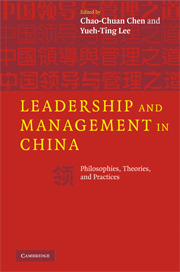Book contents
- Frontmatter
- Contents
- List of figures
- List of tables
- List of contributors
- Preface
- Acknowledgments
- Introduction: The diversity and dynamism of Chinese philosophies on leadership
- Part I The Confucian foundations
- Part II Alternative traditional Chinese leadership philosophies
- 3 Daoist leadership: theory and application
- 4 Leadership theory of Legalism and its function in Confucian society
- 5 Strategic leadership of Sunzi in the Art of war
- Part III Modern Chinese leadership theories and practices
- Index
- References
5 - Strategic leadership of Sunzi in the Art of war
Published online by Cambridge University Press: 14 May 2010
- Frontmatter
- Contents
- List of figures
- List of tables
- List of contributors
- Preface
- Acknowledgments
- Introduction: The diversity and dynamism of Chinese philosophies on leadership
- Part I The Confucian foundations
- Part II Alternative traditional Chinese leadership philosophies
- 3 Daoist leadership: theory and application
- 4 Leadership theory of Legalism and its function in Confucian society
- 5 Strategic leadership of Sunzi in the Art of war
- Part III Modern Chinese leadership theories and practices
- Index
- References
Summary
Much previous writing on Sunzi and his book, the Art of war, has focused on strategies and tactics of disguise, deception, and maneuvering for the purpose of winning. In this chapter, however, we study the Art of war from a leadership perspective, namely, how, in the view of Sunzi, military commanders exercise strategic situationalism, namely, situation-making (zhao shi) to lead an army to victory. Based on the analysis of the Art of war, we delve into Sunzi's philosophical views of humaneness, holism, and dialecticism. We then identify the positive and negative attributes of a leader in relation to strategic leadership. Furthermore, we elaborate Sunzi's strategic situationalism into (a) creating positional advantage in the environment, (b) creating organizational advantage within the organization, (c) building morale within the troops, and (d) leveraging and adapting to situations. Finally we discuss theoretical and practical implications of Sunzi's strategic leadership theory in a global environment.
Historical background and philosophical foundations
The exact period of Sunzi's life is the subject of debate. Giles believed (Garvin, 2003) that Sunzi was a contemporary of Confucius in the Spring and Autumn Period in Chinese history (771–481 BCE) whereas Griffith (1971), who wrote his doctoral dissertation on the Art of war, concluded that Sunzi was born a generation after Confucius and that the Art of war was written during the chaotic and turbulent period of the Warring States (453–221 BCE) that followed the Spring and Autumn Period.
- Type
- Chapter
- Information
- Leadership and Management in ChinaPhilosophies, Theories, and Practices, pp. 143 - 168Publisher: Cambridge University PressPrint publication year: 2008
References
- 6
- Cited by



